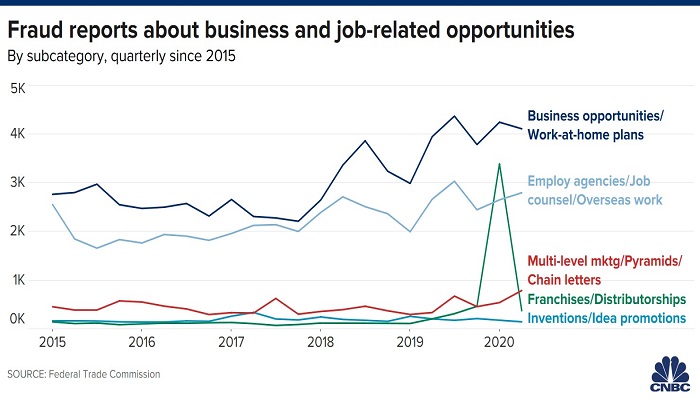
How To Avoid Online Job Scams?
- Posted On : 27th July 2022
- Written By : Admin
A scam is a fraudulent plan or scheme employed to defraud someone of something, often for money or self-benefit. Although the worldwide pandemic has forced some businesses to permit members to work from home, the idea is not new. Many people have used working from home as a means of income generation in the past and are still using it in the present.
However, that does not imply that all remote or online employment offers are genuine. Some of them are outright frauds carried out by those looking to access your private data or con you into parting with cash.
Here are several red flags to watch out for while you evaluate online job offers and advertisements.
Job postings or emails frequently contain mistakes:
Legitimate businesses never use personal email accounts to communicate; instead, they use business email addresses. Consider it a warning sign if a job offer arrives from what looks to be a personalized address, such a Gmail account. Multiple grammatical mistakes or misspelt words in an email are another indication that the sender may be attempting to trick you. These kinds of mistakes could indicate that the con artist is merely careless. All save the most naive recipients, who make for excellent scamming targets, might be eliminated, though.
Job Requirements and Descriptions Are Unclear:
You will probably note that job advertisements almost always include precise information about the job duties, hours, and prerequisites for the position being offered if you frequently glance at them. One may also disclose one's salary and benefits. Vague and sparsely detailed job ads are among those which lead to a financial fraud. You might get an email once you respond to this kind of advertisement. Take note if other aspects of the email look generic, including the absence of your name in the salutation. If that's the case, it's probably a canned response given to every victim of the scam.
What you believed to be an employment possibility but were not:
You did register or apply online for what you believed to be an employment opportunity. Then you receive a response proposing you a subscription to a job directory or a paid career service like counselling. While there may be a subscription or product you may purchase, promoting a job in order to obtain your contact information and money seems unethical.
To access the opportunity, there are costs involved:
Scammers prey on people who are frantically looking for work online. To qualify for an alluring employment offer, a con artist may demand payment for a certification programme or training course. You might receive something in exchange for the money, but it won't be a job. You won't be paying to apply for a job if the offer is real.
Interviews are conducted using messaging apps:
What you would anticipate from a reliable organisation is an online job interview conducted using web-based interviewing technologies. Be cautious, however, if you're offered an interview using a messaging app like Hangouts or Yahoo Messenger. Scammers "interview" someone for a job using these services. They then extend an offer of employment to you before the interview is over and request personal details, like your Social Security number or banking information, to set up direct deposit for your next pay checks.
The business has little to no online presence:
When an organisation provides a position that interests you, it can be beneficial to look into its history. Look at its website to evaluate if it appears to be simple and ambiguous or professional and comprehensive. Examine any social media pages and see if there are followers, examples of company events, and real employees. Additionally, check for the brand on LinkedIn. If it's authentic, the company page will have a link that will take you to the employee profiles of actual people who work there.

(Credit - cnbc.com)
A Need to Employ Instantly:
Be cautious if you encounter an advertisement for a business that is recruiting right away or uses a same-day hiring procedure. In addition, gently inquire as to why if a representative approaches you soon after you apply and states that the organization is trying to fill the position the same day or the coming week. Just 4% of all job-seekers get a response the same day they apply on. Plus, a proper hiring process requires time, regardless of how quickly an organisation wants to close the position.
The Website Address Has Been Modified Slightly:
Put your detective hat on if you notice a job posting that looks to be from a reputable organisation and is offering online employment opportunities. If you click the link, you can be taken to a website that appears authentic, but carefully review the web address. Check the address for a small modification, like an extra letter, a dash, or a dot. Scammers frequently copy popular websites and use a slightly modified web address to lure unwary job searchers in.
Unfortunately, no matter how well-versed you are on the various varieties and the warning indicators they exhibit, you may never be completely protected from job scams. Since con artists are getting craftier, employment scams are occurring frequently, you can even find yourself in a situation where you actually need a job and become a victim of one.
Due to this, whenever you stumble across a posting that sounds suspicious, be sure to:
- Conduct a search online.
- Speak to someone you can trust.
- Never pay to secure a job guarantee.
- Make contact with the organization.
- Never consent to any kind of wire transfer.
- Never consent to giving a prospective employer access to your bank information.
- Avoid interacting with prospective employers who pressure you to move quickly.
- If you have not applied, do not accept an offer.
Here are seven things to do if you are online scammed:
- Alter any personal information that has been shared with the con artists. Change all account passwords, call banks and other financial institutions to update account information, and request that alerts be placed on any open accounts you may have.
- Opening new credit lines in someone else's identity using their private information is a frequent trick that con artists do. Place a fraud alert on your credit report by contacting Experian, Equifax, and Transunion, and they will notify you if any action is reported under your name.
- Scammers occasionally use actual company names to collect information. Inform the real organisation that a scam is being perpetrated using their name.
- Google utilises this pages to assess phishing attempts in an effort to protect users and eliminate phishing pages. Report that suspicious page to Google.
- The Federal Trade Commission is open to complaints on companies, their methods, and any instances of identity theft. After receiving a complaint, they will look into it.
- Make a complaint to the Better Business Bureau. They will look into the business and the complaint, and they will also disseminate the information. You can review (and report!) job frauds using the Better Business Bureau's scam tracker.
- Internet crime allegations are investigated by the Internet Crime Complaint Centre (IC3). Once an inquiry has begun, the complaint may be forwarded to the proper law enforcement agency for further action.
Be smart and search safely, and familiarize yourself with the necessary steps to keep yourself safe and secure while applying jobs in online.
